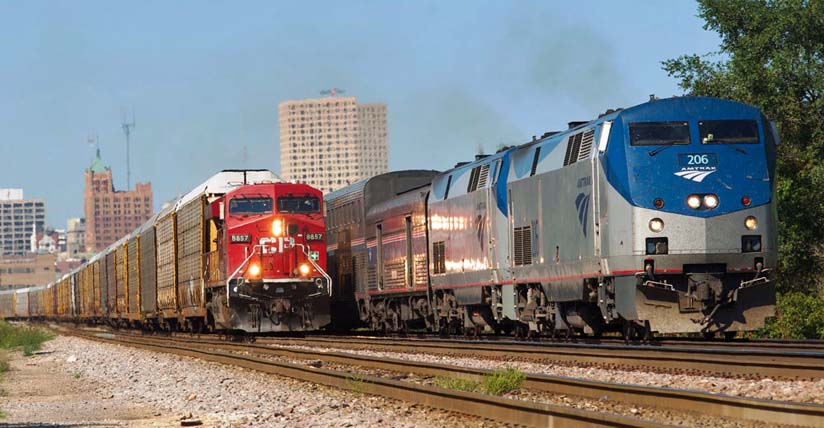
Washington District of Columbia USA - Canadian National (CN) claims it has found additional train count inconsistencies in the
Canadian Pacific-Kansas City Southern (CPKC) merger application and related environmental filings.
The Surface Transportation Board (STB) last month put review of the CPKC merger on hold until discrepancies in train density data could be sorted
out.
CP has provided the board with clarification of the data but regulators have yet to resume the merger review.
Now CN says that CP's deal with Amtrak to expand service between Chicago and the Twin Cities raises train counts enough to trigger the STB's
environmental review requirements on two line segments.
The first is between Chicago and Oconomowoc, Wisconsin, which is 35 miles west of Milwaukee.
The new Amtrak service would boost train counts by 6.28 per day between Chicago and Milwaukee, and by four trains per day between Milwaukee and
Oconomowoc.
The second is in Minnesota between River Junction West and Newport, where CN says traffic growth would exceed the eight trains per day that would
require an expanded environmental review.
CP in January agreed to permit more frequent Amtrak service on the Hiawatha route linking Chicago and Milwaukee, as well as extending the corridor
to St. Paul, Minnesota, with the addition of a daily Chicago-Milwaukee-St. Paul train.
CN, in regulatory filings on Monday, says the merger application and environmental review filings were not updated to reflect the new, higher,
train counts stemming from the CP/Amtrak agreement.
As a result, communities along the two line segments did not receive notice of the environmental impact statement scoping process, CN
argues.
CN also flagged inconsistencies between base year trains per day data in the merger application and environmental filings for CP's River Subdivision
in Minnesota, on Union Pacific trackage rights between Beaumont and Rosenberg, Texas, and on BNSF Railway trackage in the Twin Cities
area.
"Close inspection of the base year Trains Per Day Data, both those submitted as part of the CPKC merger application, and those submitted to
the Office of Environmental Analysis, reveal inconsistencies that have not, and likely cannot, be explained in a meaningful or logical way,"
CN wrote in its filing.
"Applicants' submissions, which are rife with inconsistent and inaccurate base year train count data, impair STB's ability to ensure the
professional and scientific integrity of its environmental analysis," CN contends.
CN is asking regulators to force CP to divest the KCS former Gateway Western routes linking Kansas City and St. Louis with Springfield,
Illinois.
This would allow CN to create a new single line route between Kansas City and Eastern Canada.
CP CEO Keith Creel this month told the North East Association of Rail Shippers that he doesn't expect a traffic density data issue to delay the
overall timeline for regulatory review of the merger.
The railroads provided one set of traffic density data for the merger application itself and another set for the STB's environmental
analysis.
The railways have explained that they calculate gross ton miles differently, with CP breaking down tonnage in far more detail for each line segment,
and have clarified the data in a filing with the STB.
Creel says it's now up to the STB to ask for more information or to reinstate the merger review clock.
"It's not surprising. These are very complex discussions when it gets to traffic density, and this process. I'll tell you this, the STB is very
thorough, they want to get this right, and I understand that," Creel said.
"We think we'll be back on track soon," he added.
CP expects the board to issue a decision on the merger late this year or early in 2023.
Bill Stephens.
(there was no image with original article)
(usually because it's been seen before)
provisions in Section 29 of the Canadian
Copyright Modernization Act.
